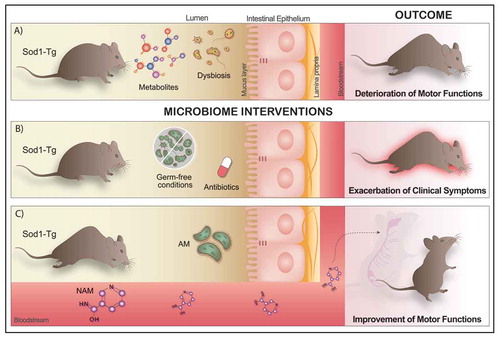Figures & data
Figure 1. The role of the gut microbiome and its metabolites in an ALS mouse model. (a) SOD-1 transgenic (SOD1-Tg) mouse model of ALS present a distinctly different microbiome composition, even before the onset of any motor impairment and altered metabolites configuration, leading to the deterioration of motor functions after 140 d. (b) Depletion of the gut microbiome by administration of broad-spectrum antibiotics in the drinking water or using germ-free SOD1-Tg mice induces a rapid exacerbation of the clinical symptoms of the disease. (c) Oral administration of Akkermansia muciniphila (AM), a specific commensal bacterium, has beneficial effects on the ALS clinical outcomes, slowing down its progression in SOD1-Tg mice. On the other hand, AM is able to produce metabolites which in turn reach the nervous system through the bloodstream and therefore could impact the course of the disease. Thus, systemic administration of nicotinamide (NAM) via osmotic pumps significantly improved motor functions in the SOD1-Tg treated mice.

